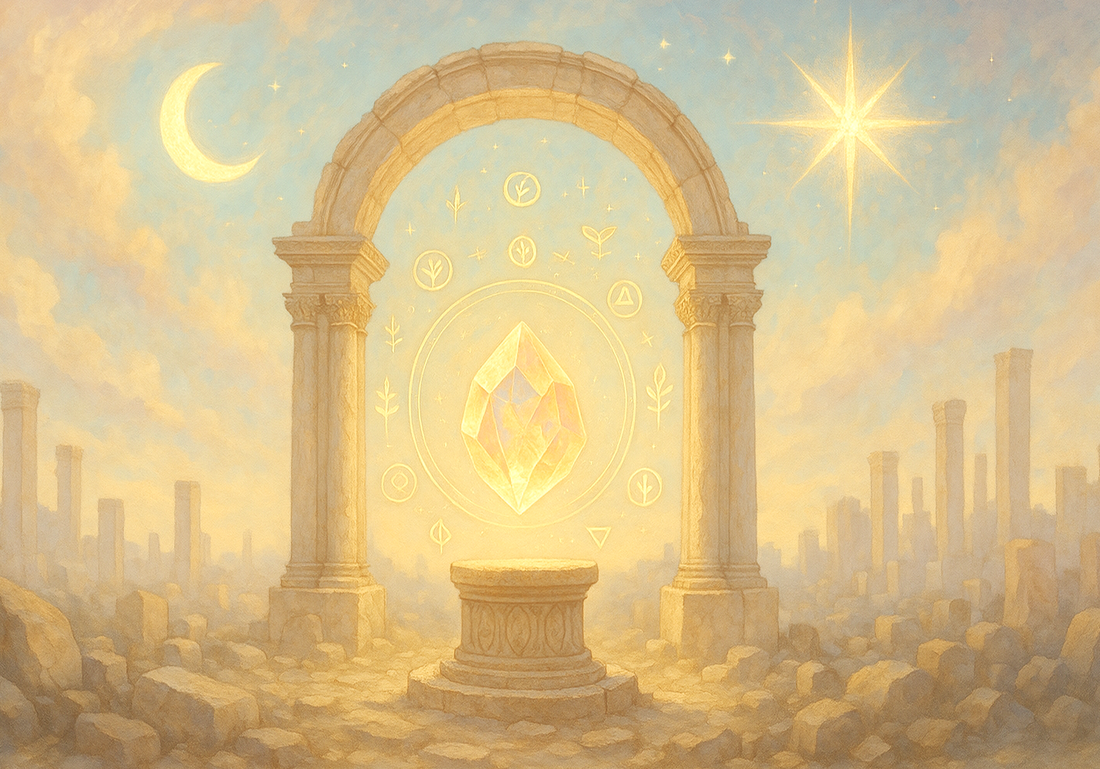
Oracles: Messengers of the Divine and the Unknown
Share

Introduction: The Eternal Quest for Knowledge
Religion and mysticism have taken center stage in a whirlwind of discussions since religion and critical thought themselves were coined into existence. Be it ancient or modern philosophers or mere conversations between friends, we all seek a truth that can never be foretold and answers that are not meant to be found. This is where the extremely human needs for justification and rationalization come into play.
Belief, Fate, and the Power of Oracles

People have chosen different ways to explain the existence of powers beyond our control. From religion to astrology to oracles, there have been multiple sources of hope and understanding. Some philosophers, such as William James, the father of American psychology, have argued that belief itself can be justified even without evidence in certain cases (James, 1896).
Particularly when the belief in question can lead to new evidence or make the belief true (James, 1896). He argues that beliefs can shape our experiences and outcomes, suggesting that belief plays a significant role in how we live and interact with the world, and disproves efforts to take beliefs away from people (James, 1896).
In this article, we’ll focus on oracles as pieces of the supernatural that have always fascinated people from all over the globe.
The Origins of Oracles: Voices of the Gods
The word oracle originated from the Latin “oraculum,” meaning divine announcement (Etymology of “Oracle” by Etymonline, n.d.). With its roots in the word “ōrare”, to pray or to plead — the very etymology of the word paves the way for the modern understanding of what an oracle is.
An oracle, crudely put, is a vehicle of divination – a person, place, or object able to predict the future while simultaneously offering answers to life’s questions, often in a cryptic or mysterious way (Posada, 2012). An ancient priestess speaking in tongues, a bag of stones cast on the ground, or cards laid on a table. Those are all prime examples of what we’d call an oracle.
Below, we’ve gathered some of the most prominent oracles through time and their unique methods for conquering the divine.
The Oracle of Delphi: The Voice of Apollo
One of the most renowned oracles in history is the Oracle of Delphi, a priestess known as the Pythia, who resided in the Temple of Apollo in Delphi, Greece. The Delphic Oracle was consulted by individuals and states alike, seeking guidance on everything from warfare to personal dilemmas (Jones & Collier, 2022).

The Pythia, often an older woman chosen for her wisdom and purity, would enter a trance-like state induced by inhaling vapors that emerged from a chasm in the earth beneath the temple (Odio, 2024). The gases, thought to contain ethylene or other psychoactive substances, likely contributed to her altered state. While entranced, she would utter cryptic pronouncements, which the temple priests would then interpret into poetic verses for the seekers of wisdom (The Editors of Encyclopaedia Britannica, 2025).
"If you go to war, you will destroy a great empire."
This response was given to King Croesus of Lydia, and though it came true, it was his own empire that fell. Similarly, the Athenian general Themistocles sought the oracle’s guidance and was told that a "wooden wall" would protect Athens. He interpreted this to mean the Greek navy, leading to victory at Salamis (Jones & Collier, 2022).
Despite its mysterious nature, the Delphic Oracle remained an influential institution for centuries, embodying the enigmatic role oracles have played in history.
Nostradamus: The Poet of Prophecies
Michel de Nostredame, known as Nostradamus, was a 16th-century French astrologer, physician, and seer whose prophecies have fascinated and perplexed readers for centuries (The Editors of Encyclopaedia Britannica, 2025). His book Les Prophéties (1555) contains hundreds of four-line verses believed to predict future events (George, 2023).
Nostradamus used a combination of astrological calculations, historical patterns, and mystical visions to craft his predictions (George, 2023).

Some of his most famous alleged prophecies include the rise of Napoleon and Hitler, the Great Fire of London, and even the 9/11 attacks. One often-cited quatrain states:
"The sky will burn at forty-five degrees / Fire approaches the great new city"
Supporters claim it refers to New York City; skeptics argue the vagueness allows for wide interpretation. Nevertheless, Nostradamus remains one of the most well-known historical oracles, shaping both media and modern myth.
Baba Vanga: The Blind Seer of the Balkans
Baba Vanga, a Bulgarian mystic and clairvoyant, has been called the "Nostradamus of the Balkans." Born in 1911, she lost her sight at 12 during a storm, an event her followers claim triggered her psychic gifts (Neill, 2023).

She gained fame as people from all over Eastern Europe, and even political leaders, sought her insight. Her followers credit her with foreseeing the collapse of the USSR, the Chernobyl disaster, the 2004 tsunami, Obama’s presidency, and more (Desk, 2025).
"Horror, horror! The American brothers will fall after being attacked by birds of steel."
Many interpret this as a prediction of 9/11. Her predictions were not written but passed down orally, leading to questions of their authenticity. Still, she remains highly respected in the Balkans.
Conclusion: The Enduring Legacy of Oracles
From the Delphic Pythia to Nostradamus and Baba Vanga, oracles have captivated the imagination of those yearning for insight beyond the physical world. Today, this search continues in astrology, tarot, and crystal healing.
This timeless desire is reflected in the work of ANAS Crystal Care, whose crystal-infused products aim to align mind, body, and spirit through ancient wisdom and modern self-care.

Just as ancient oracles provided guidance, these products offer modern tools for personal reflection and balance.
Read more:
Connecting Astrology and Crystals: Personalized Guide for Every Zodiac Sign
References
James, W. (1896). THE WILL TO BELIEVE. In New World. https://krypton.mnsu.edu/~jp6372me/THE%20WILL%20TO%20BELIEVE%20.pdf
Etymology of “oracle” by etymonline. (n.d.). Etymonline. https://www.etymonline.com/word/oracle
Posada, J. (2012, May 20). What is an Oracle? - Jennifer Posada and The Oracle School & Community. https://www.jenniferposada.com/what-is-an-oracle
The Editors of Encyclopaedia Britannica. (2025, March 18). Delphic oracle | Definition, Greek Mythology, Pythia, & Facts. https://www.britannica.com/topic/Delphic-oracle
Odio, S. (2024, May 26). The Oracle of Delphi: Ancient Wisdom and Mystical Insights - Good Shepherd Academy Int’l. https://gsacademy.org.ng/2024/05/26/the-oracle-of-delphi-ancient-wisdom-and-mystical-insights/
Nostradamus: Which of his predictions came true? (n.d.). Sky HISTORY TV Channel. https://www.history.co.uk/articles/nostradamus-which-of-his-predictions-came-true
George, S. C. (2023, December 25). Who was Nostradamus and what did he predict? Discover Magazine. https://www.discovermagazine.com/the-sciences/who-was-nostradamus-and-what-did-he-predict
The Editors of Encyclopaedia Britannica. (2025, March 13). Nostradamus | Biography, Predictions, & Facts. https://www.britannica.com/biography/Nostradamus
Neill, C. (2023, February 15). Baba Vanga: The Bulgarian Mystic who predicted 9/11, Brexit and more. History Hit. https://www.historyhit.com/baba-vanga-the-bulgarian-mystic-who-predicted-9-11-brexit-and-more/
Desk, T. T. (2025, January 16). Baba Vanga’s predictions for 2025: Complete list and the ones that have come true. The Times of India. https://timesofindia.indiatimes.com/etimes/trending/complete-list-of-baba-vangas-predictions-and-the-ones-that-have-come-true/articleshow/116589246.cms
Валентинова, Р. (2025, March 10). Ванга: Novini.bg. https://novini.bg/article/2025031010581554380
